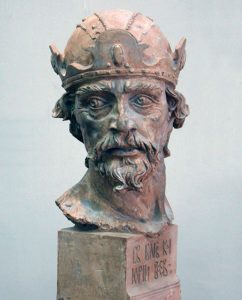
Nizhny Novgorod (often colloquially Nizhny, Gorky from 1932 to 1990) is a city in central Russia, the administrative center of the Volga Federal District and the Nizhny Novgorod Region. It is the largest city in the Volga Federal District and on the Volga River. The city was established on February 4, 1221 by Vladimir Prince Yuri Vsevolodovich. Here, in this article, we will discuss not about the city but the founder. How interesting was his life and how did he found the city?
Brief Biography of Yuri Vsevolodovich
Yuri was born in the city of Suzdal in 1188 and was the third son of Prince Vsevolod the Big Nest and his first wife. In the early years he took part in several campaigns against other princes together with his brothers (1207 – a campaign to Ryazan, 1208-1209 – a campaign to Torzhok). In 1211, he married the daughter of the Prince of Chernigov.
Since 1211, the name of Yuri appeared more and more in the annals in connection with the conflict with his brother Konstantin. Yuri’s father, Vsevolod the Big Nest, contrary to tradition in 1211, had given the right to reign in Vladimir not to his eldest son Konstantin, but to Yuri. After the death of Vsevolod in 1212, Konstantin, offended by the actions of his father, declared his rights to Vladimir and the Grand Duchy.
An internecine war erupted between Yuri and Konstantin, which then lasted for several years. Vladimir and Svyatoslav took the side of the elder brother, while Yaroslav took the side of Yuri. Initially, the brothers tried to agree peacefully: Konstantin was ready to give Suzdal in exchange for Vladimir, but Yuri wanted to get the right to reign in Rostov. The brothers failed to agree peacefully.
Konstantin and Yuri several times (in 1213 and 1214) were going to join each other with the troops, but each time the battle did not bring any luck to any of the brothers – their clashes always ended with standing on the Ishna River, when no army could surpass the other. This conflict was resolved only in 1216, when Mstislav Rostislavich joined the army of Constantine. Together, they were able to invade the Vladimir-Suzdal principality, defeated the army of Yuri and Yaroslav, and put Vladimir Konstantin on the throne.
However, in 1218, Konstantin died, and the throne of Vladimir again passed on to Yuri Vsevolodovich according to the will of Konstantin. Shortly before his death, Konstantin also handed over Suzdal to Yuri. Since then, Yuri never left the Grand Princely throne until his death in 1238.
Foreign and domestic policy of Yuri Vsevolodovich
Yuri Vsevolodovich was not a supporter of open military conflicts, so most of his foreign policy was aimed at stabilizing relations with neighboring states and protecting his own political interests through negotiations and cunning. Avoiding open conflicts, he was able to achieve significant success.
Despite the fact that Yuri did not want to fight, during his reign several successful campaigns were made, some of which still ended in battles. In 1220, Yuri sent an army against the army of the Volga Bulgars, who managed to occupy significant territories right up to the city of Ustyug. The army led by Svyatoslav successfully reached the Bulgarian lands and devastated several cities, thereby inflicting a serious retaliatory blow to the Bulgarians. In the same year, Yuri received a peace proposal from the Volga Bulgaria, which he rejected. In 1221, Yuri received two more offers from the Bulgarians and agreed to peace only the third time. Since then, Russia had had a serious influence on the territory of the connection of the Oka and Volga rivers. To consolidate the success, Yuri built a city here – Nizhny Novgorod.
In 1222 and 1223, Yuri was fighting the Estonians near Revel in alliance with the Lithuanians, who would later forget about the agreement with Yuri and again opposed Russia, ruining its lands and occupying territories. The small conflict between Yuri and Novgorod belonged to the same period.
In 1226, Yuri began the struggle with the princes from Mordova for the territory around Nizhny Novgorod. After a series of campaigns by Yuri in 1226, 1228 and 1229, Mordova attacked Nizhny Novgorod, a long struggle for land ensued, which lasted for several years with varying success. A little later, during the invasion of the Mongols, part of the Mordovian princes defeated by Yuri came out on the side of the Mongol-Tatars and recaptured the lands that had been previously captured from Russia.
In 1236, Batu Khan came to Russia and began to rapidly conquer Russian lands. By 1237, he managed to take Ryazan, Kolomna, and later Moscow. Learning about what was happening from his son, Vladimir, Yuri gathered troops and went to the Volga, got up on the River City and began to gather additional forces from the surrounding villages. Brothers Yaroslav and Svyatoslav were also going to come to the aid of Yuri, however, the Russian princes failed to assemble an army on time – Batu acted swiftly and already in February 1238 the Tatars took Vladimir and burned the whole family of Yuri.
Yuri Vsevolodovich died on March 4, 1238 during a return campaign of the Russian princes against the Tatars.
The results of the reign of Yuri Vsevolodovich
Despite the fact that many historians see the guilt of Yuri Vsevolodovich that Russia was subjected to raids by the Tatar-Mongols and terrible ruins, he still did a lot for the state. Under Yuri, several large cities were built, he managed to make peace with several border states, successfully resisted raids and protected the integrity of the state until the invasion of Batu. In addition, many cathedrals and churches were built on his orders. For his contribution to the development of Christianity in Russia, as well as for mercy to the enemies, Yuri Vsevolodovich was canonized in 1645.
